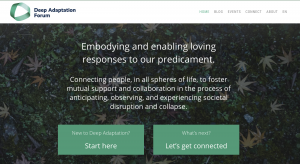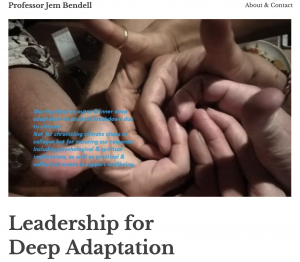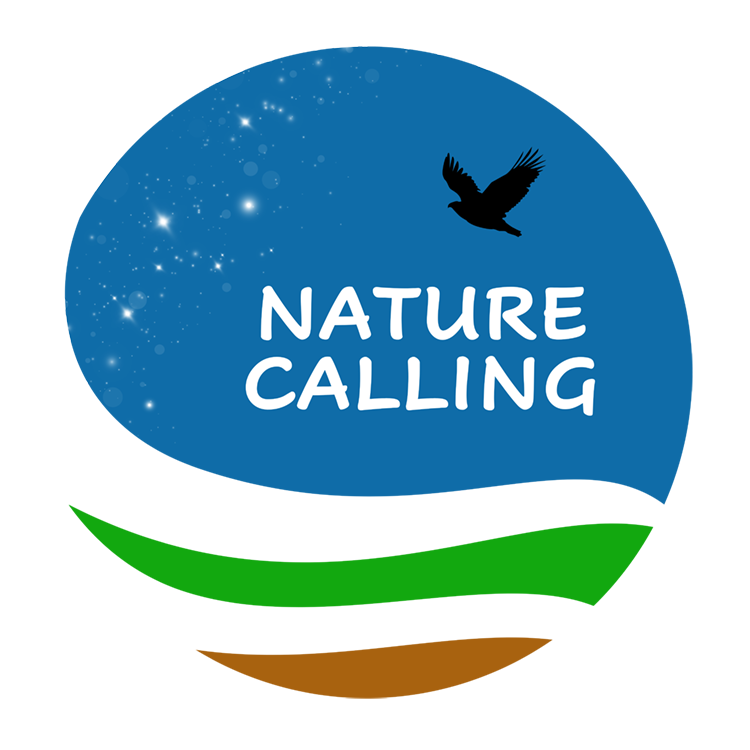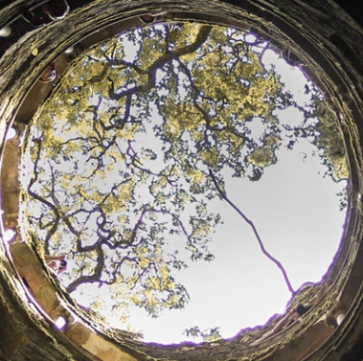Whichever way you cut it, we’re in for darkening times. That much is assured. We need to start talking about this if we want to survive, for as long as we can, with any shred of dignity. And there is a challenge, raise the bar! We want to be going down fighting, but with the good fight in mind, the one where we take care of each other, compassionate beings knowing our destiny was always death beyond whatever we could achieve in this lifetime, not reacting harshly to this bottom line, remembering there were never any promises, holding out a helping hand whenever we can.
So I took part in this course, Leadership and Communication during Societal Breakdown, with Jem Bendell and Katie Carr. Jem has been writing the Scholars Warning letters since November 2020. They outline the risks of societal collapse and argue that we desperately need our so-called leaders to act on climate science. It’s like a gathering of educated adults acting like a heroic Swedish school kid, or something crazy like that. I’m proud to join hundreds of these wise souls from dozens of academic disciplines including climatology, environmental science, psychology and sociology.

Of course, i no longer believe we will effect meaningful change in time to avert disaster. That is no longer the point, for me and those others who know the data, the habits we are stuck in, the longer picture of civilizations collapsing one after the other into the desert sands. After 30 years of environmental activism, i accept our imminent demise and work to Save Our Souls instead. Send out the Morse Code, like climate scientists did at the Rio Earth Summit in 1992. Yes, 30 years ago now!
Jem also commented meaningfully on this anniversary here. His work to raise awareness of just how dire things have gotten is often called ‘doomism’, but critics miss the point – without facing reality squarely, we will never change. Like the Extinction Rebellion movement, he follows the psychological realisation that anticipating massive disruption and even the breakdown of industrial consumer societies helps inform those of us who are highly motivated for radical action. Welcome to Deep Adaptation at a glance!

Signatories of the Scholars Warning letters are now connecting with each other and exploring potential collaboration and future action, through the Leadership and Communication during Societal Breakdown Course. Alongside Jem’s expert knowledge about the ways conventional leadership is failing us in terms of facing possible collapse, facilitator Katie Carr holds the group in empathic listening and collective investigation of the question: what makes a good leader in the current historical context? Both Jem and Katie embody the leadership that is a strong contender for the answer to this question: it’s as good as we can approximate to a circular counsel, as focused on supporting each other as coming to any kind of necessary consensus. Along with others, i paid it forward, so if you want to pursue this course of action start here.
Dismayed as i am since those heady days when we seemed to still have hope – to turn the ship around, to convince world leaders and the public we actually had to, to become green and sustainable – i work mostly in the field of psychotherapy nowadays. At least we can hope to help people who turn to face the dangers now cascading across the horizon to breathe, to care for each other while we still can. But it isn’t enough to hold off the grief. The other night i slipped out behind the laundry to sob so that my children didn’t have to see the inconsolable fear and grief in my eyes. They don’t need to witness this yet; their futures will be impoverished enough, compared to the relatively benign, even beautiful decades i have enjoyed.
Weeping Song by Nick Cave and the Bad Seeds.
Entering the course i was convinced by the NTHE data and that hasn’t changed. So it was a great relief to recall how much meaningful work, alongside other people, brings you back around to life, to what is important. I know this from my work in the ecotherapy field, especially seeing the enormous benefit that community gardens have brought so many, both here and in the UK. But this went beneath my comfortable intellectual understanding, to bring me back into the fold. I’m most comfortable on my own or with nature – inner or cosmic, i can usually find happiness, or at least solace, in philosophy or dreaming. Other people – who even are they? Strangers, sometimes friends, aliens … my weakness.
Thankfully i find enough inner resources to reach out, on the odd occasion, and link up with some external ones. People shouldn’t be thought of as resources – neither should natural elements – but sometimes we need to find a shoulder to cry on, a hand to lift us up, someone else to help us to understand we might be backing ourselves into a corner.
It doesn’t matter what we think or pray the future holds. What matters is what we do with our time. If you are concerned about ecosystem and societal collapse, climate chaos and all the other disaster coming down the line, let me extol the virtues of doing something about it. Not as if we are going to find some miraculous way out of our catastrophic dilemma – but as if we could still find something in each other worth holding onto.

